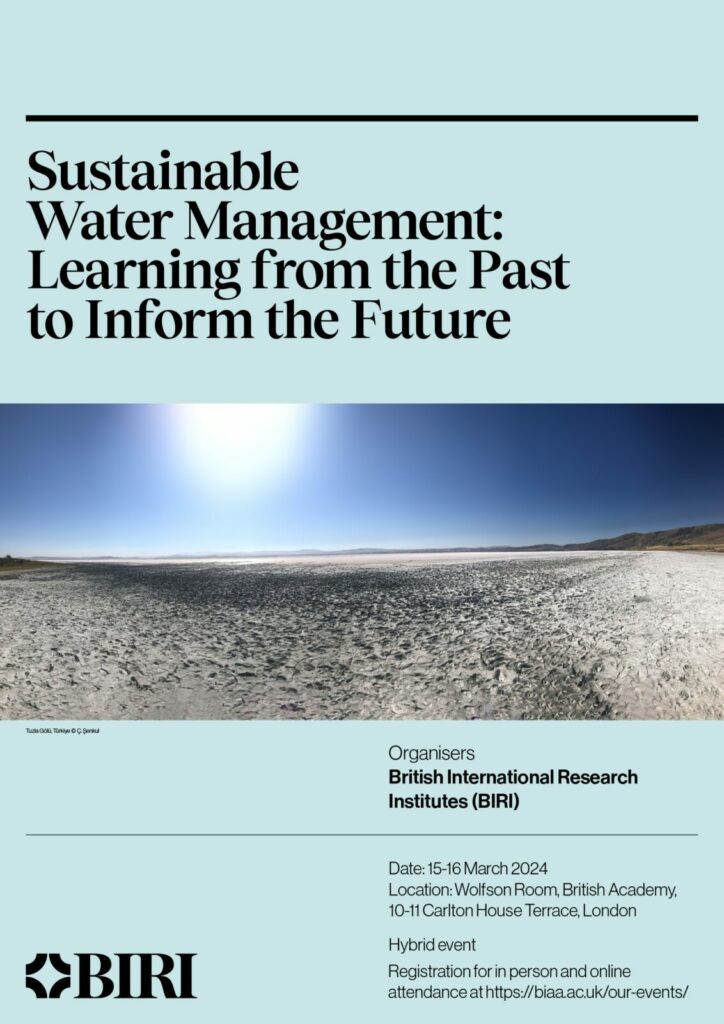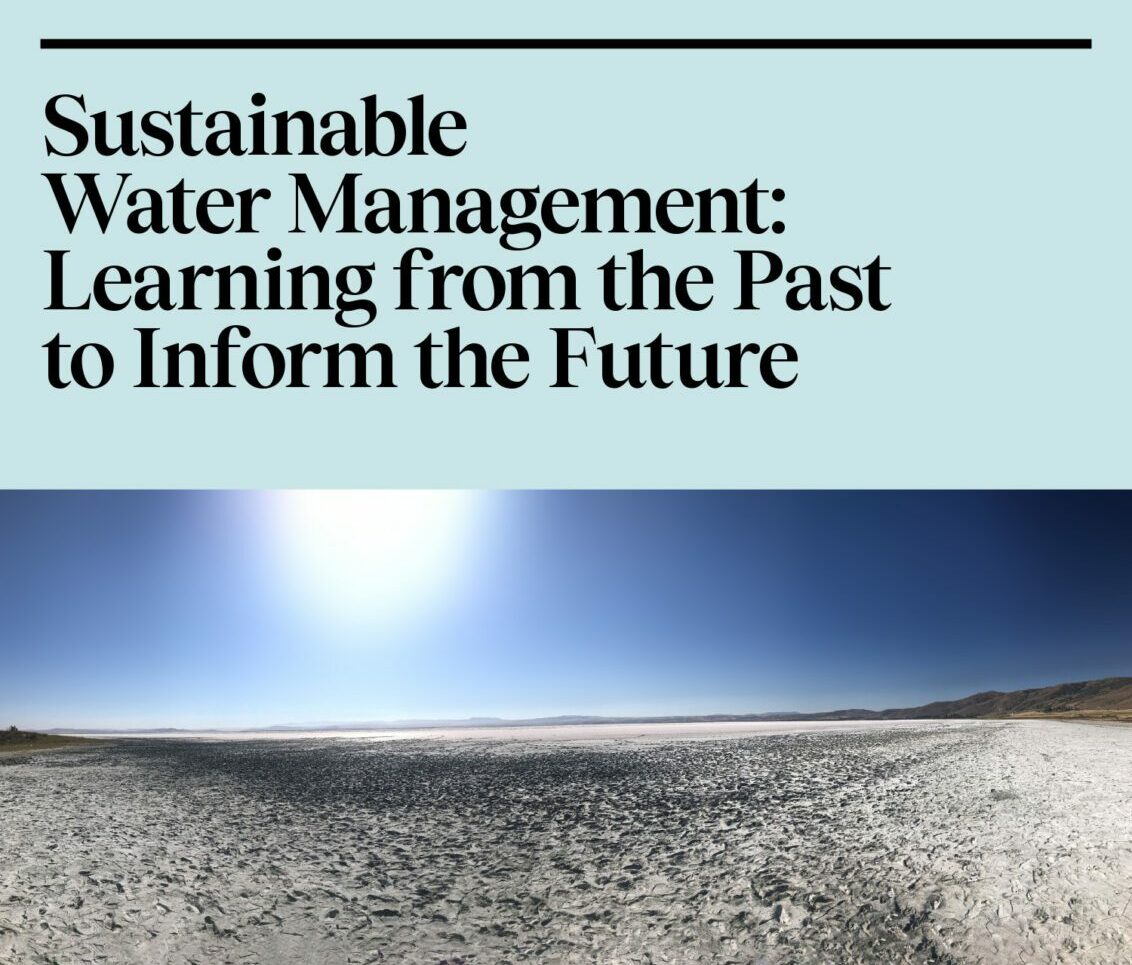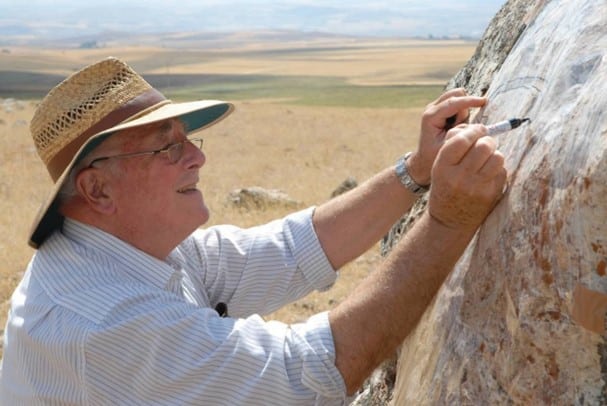
Sustainable Water Management
Conference
By Ali Khadr

A BIRI Interdisciplinary Conference:
Sustainable Water Management: Learning from the Past to Inform the Future
15th-16th March 2024, The British Academy, London
The world is facing an unprecedented water crisis due to increasingly extreme weather patterns, unsustainable water management practices, overuse of available resources, and exponential population growth. In many of the regions across which the British International Research Institutes (BIRI) operate, the impact of the climate crisis is becoming more and more tangible and reconsideration of current water management practices is urgently needed. In this context, policymakers and planners are increasingly aware of the potential relevance of past practices. Many ancient systems had much greater longevity than modern infrastructure and were often inherently more sustainable; consuming less energy, being easier to operate and maintain, and having more communal governance structures.
As today’s challenges are not directly comparable to those of the pre-industrial world – and in most cases ancient solutions cannot simply be reactivated or replicated – a multi-faceted approach involving mapping present-day problems and attitudes towards water and its use and investigating how past societies responded to the challenge of sustainably managing water resources is needed, as is consideration of geological and geographical contexts. Models can be developed based on the combined results to inform culturally appropriate planning and policy making.
The BIRI Sustainable Water Management Initiative involves all eight British International Research Institutes (BIRI) and brings archaeologists, environmental scientists, historians, engineers, social scientists, and other stakeholders together to investigate how a multi-disciplinary, inter-regional, deep-time approach can lead to better understanding of the water-related impacts of climate change and other current challenges, as well as how these can be mitigated.
Provisional Conference Programme (Please refer to the BIAA website for updates to the programme)
Day 1
9.30-9.45 Introduction (L. Vandeput)
- Applied Archaeologies of Water Management – Conceptual Issues and Potentials
Chair: Duncan Keenan-Jones
9.45-10.05 Lancelotti, C. and S. Biagetti, Archaeology’s unfulfilled potential: Bridging disciplinary gaps for sustainable development
10.05-10.25 Morabito, L., M. H. Velasco, J. Thompson, T. Stambouli, S. Ghattas, R. Foote and C. Cone, Towards water resilience through synergy: the role of archaeology, agriculture and sustainability for a holistic approach to sustainable water management in AlUla
10.25-10.45 (online) Wellbrook, K., H. Hayajneh, A. Alsouliman, P. Keilholz and H. G. K. Gebel, Applied Archaeohydrology. Traditional water management in Jordan’s southeastern Badia – potentials of rehabilitation
10.45-11.15 BREAK
- Water Management in Past Urban Contexts – Insights for the Future
Chair: Catherine Gateri
11.15-11.35 Crow, J. and L. Vandeput, Water in Istanbul: Rising to the challenges, lessons from the Byzantine/Ottoman transition
11.35-11.55 Peker, E. and A. Ilhan, A Participatory Methodological Framework for Reviving Lost Culture: Rainwater Harvesting in Istanbul
11.55-12.15 Alam, I. and C. A. Petrie Learnings from a Mughal waterscape: Modelling & evaluating Shahjahanabad’s hydrological landscape
12.15-12.35 Motta, D., M. Crapper, D. Keenan-Jones and M. Monteleone, Ancient Roman water infrastructure and long-term adaptation: insights from interdisciplinary research
12.35-14.00 LUNCH
- Rural Water Management Practices
Chair: Jim Crow
14.00-14.20 Massa, M., J. Wainwright, D. Motta and E. Peker, Fragile landscapes: The past, present and future of water use in the Konya Plain, Türkiye
14.20-14.40 Woodbridge, J., Water security in Turkey: lessons from the past to enhance socio-ecological resilience to future challenges
14.40-15.00 Stump, D., Why allowing water to erode soils is not always a bad idea: How farmers in Konso, Ethiopia, and Engaruka, Tanzania, managed soils and water for centuries, and what these practices teach us about soil and water conservation today
15.00-15.30 BREAK
- Water Governance and Infrastructure Histories
Chair: Martin Crapper
15.30-15.50 Moradi, H., Harnessing water resources in arid landscapes: A case study of the Neyriz Plain, Fars Province, Iran
15.50-16.10 Vetter, Th. and A.- K. Rieger, Ancient water harvesting in the Marmarica as a model for sustainable and adapted management of scarce natural resources
16.10-16.30 Davies, M., W. Kipkore and S. Lunn-Rockliffe, Unintended consequences, conflict and resilience in a small-scale irrigation development, Marakwet, Kenya
Day 2
- Heritage Water
Chair: Paul Lane
9.30-9.50 Thompson, A., Water infrastructure and public space: Exploring the enduring legacy of drinking fountains as place making devices in Rome
9.50-10.10 Yegen, G., ALPHA: Water management games
10.10-10.30 Dessane, D., A. Makaratzis, E. Kaçel and Y. Kurşun, Water heritage of Ayvalık: Understanding sustainable solutions of the past
10.30-11.00 BREAK
- Italian Rivers: Historical Ecologies, Management and Water Harvesting
Chair: Stephen Kay
11.00-11.20 Parolini, C., The river Aniene (Latium, Italy) from Roman times to today: a paradigm of water management system
11.20-11.40 Campopiano, M., The Po Valley and water management in the Middle Ages: The long road to unsustainability (9th-early 16th centuries)
11.40-12.00 Bannon, C., Sustainability on Roman rivers
12.00-13.30 LUNCH
- Indigenous knowledge and Technologies
Chair: Lutgarde Vandeput
13.30-13.50 Altaiee, Th. M., Ground water harvesting using ancient water transfer systems in arid regions in the context of climate change
13.50-14.10 Khorrami, N. and A. Camiz, Water and urban tissues: The Qanat system and the formation process of Yazd, Iran
14.10-14.30 Gateri, C., Water Scarcity response strategies among women residents of semi-arid regions of Kajiado, Kenya
14.30-15.00 BREAK
- Water Catchments Across Space and Time
Chair: Maurits Ertsen
15.00-15.20 Polinskaya, I. and K. Velentza, Lessons from a thirsty island: Water shortage and technological solutions in ancient and modern Aigina
15.20-15.40 (online) Kelly, A., Securing the Knossos-Iraklio water supply over two millennia, a case study.
15.40-16.00 (online) Purdue, L., Oases in Arabia: The challenges of long-term water management. Proposal for an integrated approach of these waterscapes
16.00-16.20 Gitu, K., Rethinking water use: Calling on the past to solve present challenges in the Ewaso Ng’iro Basin Kenya
16.20-17.00 Discussion
led by M. Ertsen, D. Keenan-Jones, P. Lane and C. Petrie
—
The conference will be hybrid, and the language of the conference will be English.
To register for in-person attendance, click here.
To register for online attendance for 15th March (Day 1), click here.
To register for online attendance for 16th March (Day 2), click here.
Latest News
May 3, 2022
Dr Abdulameer al-Hamdani
The Trustees of the British Institute for the Study of Iraq were deeply saddened to hear of the death of Dr Abdulameer al-Hamdani on Friday April 29th in Nasiriyah, Iraq.


